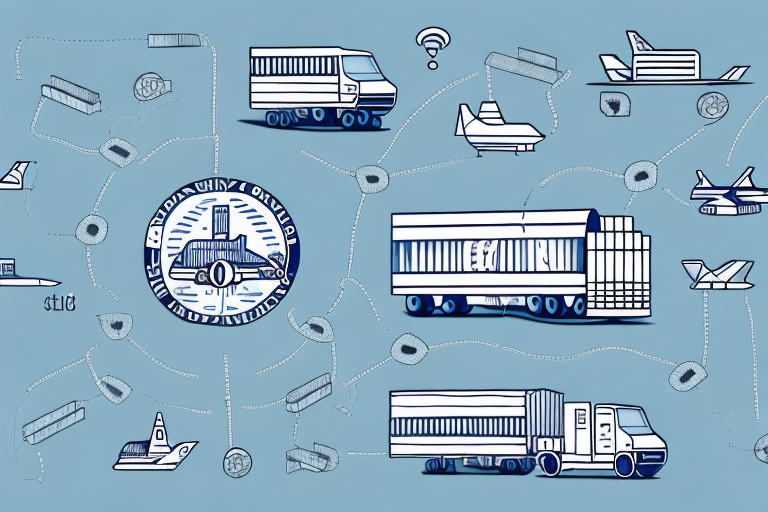Understanding the Role of Common Carriers in the Supply Chain
The supply chain is a complex network that involves multiple parties working together to ensure the timely and efficient delivery of goods from the manufacturer to the end consumer. One essential component of the supply chain is the common carrier. In this article, we will explore the role of common carriers in the supply chain, their importance, advantages, types, legal framework, challenges, risks, and best practices for building strong relationships with common carrier partners. We will also examine the trends and innovations shaping the future of the common carrier industry through case studies and expert insights from industry leaders.
The Definition of Common Carriers and Their Importance in the Supply Chain
Common carriers are entities or individuals that offer transportation services to the public for a fee. They are responsible for the safe and reliable transport of goods, materials, and people from one location to another. Common carriers play a vital role in the supply chain by facilitating the movement of goods and products from manufacturers and distributors to retailers and ultimately to the end consumer. Their importance stems from their ability to enable companies to operate efficiently by offering specialized transportation services.
Common carriers are regulated by government agencies to ensure that they operate safely and fairly. They are required to adhere to strict safety standards and maintain proper insurance coverage to protect their customers' goods and materials. Additionally, common carriers often offer specialized services such as refrigerated transport for perishable goods or oversized transport for large equipment. These specialized services allow companies to transport their products in a safe and efficient manner, ultimately contributing to the success of the supply chain.
Advantages of Using Common Carriers for Your Business Operations
There are significant advantages to using common carriers for your business operations:
- Cost Savings: Outsourcing transportation services to common carriers saves companies the time, money, and resources required to operate their own transportation fleets.
- Expertise: Common carriers offer specialized transportation services and have extensive experience in logistical requirements, such as packaging, labeling, and trucking.
- Flexibility: With a wide range of transportation options, including ground, air, and sea, common carriers can tailor their services to meet the specific needs of each business.
- Operational Focus: By partnering with common carriers, companies can focus on their core competencies, such as product development, marketing, and sales, while reducing their overall operational costs.
The flexibility offered by common carriers allows companies to adjust their transportation strategies based on changing market conditions, customer demands, and other factors that may impact their operations. This agility is crucial for maintaining competitiveness in today's fast-paced business environment.
Types of Common Carriers and Their Specializations
Common carriers specialize in different types of transportation, including:
- Air Transport: Known for its speed and efficiency, making it a popular choice for time-sensitive shipments. Common carriers specializing in air transport navigate strict regulations and security measures to ensure on-time deliveries.
- Sea Transport: Requires specialized navigation, communication, and handling equipment. Common carriers in this sector manage large volumes of goods over long distances.
- Rail Transport: Suitable for bulk goods and large quantities over land. Rail carriers offer cost-effective solutions for long-distance freight.
- Road Transport: Provides flexibility and door-to-door service, essential for local and regional deliveries.
Additionally, freight forwarders and logistics providers are two types of common carriers that specialize in offering integrated logistics services such as warehousing, customs clearance, and freight consolidation. Their expertise reduces supply chain complexities and enables companies to optimize their operations.
Common carriers also offer value-added services such as packaging, labeling, and assembly. These services help companies streamline their supply chain and reduce costs by outsourcing non-core activities, allowing them to focus on their primary business functions.
The Legal Framework Governing Common Carriers and Their Responsibilities
The common carrier industry is regulated by government bodies that oversee licensing, safety, insurance, and liability issues. Common carriers must comply with various local and international regulations, including the safe handling and transport of hazardous materials. Maintaining appropriate insurance coverage is essential to protect against accidents, losses, and damages during transportation. Due to their legal responsibilities and potential liability, common carriers face significant financial and reputational risks.
Common carriers are also responsible for providing quality service to their customers. This includes:
- Timely delivery
- Proper handling of goods
- Clear communication throughout the transportation process
Failure to meet these expectations can result in loss of business and damage to the carrier's reputation.
Furthermore, common carriers must consider the environmental impact of their operations. They are expected to comply with regulations related to emissions, waste disposal, and energy efficiency. Many carriers have implemented sustainability initiatives to reduce their carbon footprint and promote eco-friendly practices.
Factors to Consider When Choosing the Right Common Carrier for Your Business
Choosing the right common carrier partner is critical to the success of your supply chain operations. Key factors to consider include:
- Reputation: Assess the carrier’s track record and customer feedback.
- Reliability: Ensure the carrier consistently meets delivery schedules.
- Capacity: Confirm the carrier can handle your shipment volumes.
- Cost: Evaluate pricing structures and value for money.
- Speed: Consider the carrier's ability to deliver within required timeframes.
- Coverage: Check the carrier’s geographic reach and service areas.
Additionally, evaluate potential common carrier partners based on their industry expertise and the extent of their network. Technology and communication capabilities are also crucial; features such as real-time shipment tracking, automated notifications, and data analytics can provide valuable insights into supply chain performance. Excellent customer service and responsiveness are essential for addressing inquiries or issues promptly.
By prioritizing these factors, businesses can avoid costly disruptions and ensure quality service delivery.
The Impact of Technology on the Modern Common Carrier Industry
Advancements in technology have significantly transformed the common carrier industry. Key technological impacts include:
- Real-Time Tracking Systems: Enhance visibility and traceability of shipments.
- Internet of Things (IoT) Devices: Provide real-time monitoring of shipment conditions.
- Scheduling Software: Optimizes delivery routes and improves on-time performance.
- Advanced Analytics and Machine Learning: Optimize routes, reduce fuel consumption, and enhance service delivery.
These innovations drive efficiency, reduce costs, and improve the overall quality of transportation services. For example, implementing real-time tracking can reduce delays by up to 20%, as reported by the ShipScience Technology Report 2023.
Challenges Faced by Common Carriers and How to Overcome Them
Despite their critical role in the supply chain, common carriers face several challenges:
- Capacity Constraints: Managing fluctuating demand can strain resources.
- Driver Shortages: A lack of qualified drivers impacts delivery capabilities.
- Regulatory Compliance: Navigating complex local and international regulations.
- Security Threats: Protecting shipments from theft and fraud.
- Environmental Concerns: Meeting sustainability and emissions standards.
To overcome these challenges, common carriers can adopt innovative strategies such as:
- Investing in sustainable technologies to reduce environmental impact.
- Implementing more efficient routing and scheduling systems to optimize operations.
- Fostering collaborative partnerships with other carriers to share resources.
- Embracing emerging trends like drones and autonomous vehicles for last-mile delivery.
These strategies can help carriers enhance efficiency, reduce costs, and maintain a competitive edge.
Managing Risks Associated with Using Common Carriers in Your Supply Chain
Using common carriers introduces various risks to the supply chain, including:
- Damaged Goods: Risks during handling and transportation.
- Theft: Protecting shipments from unauthorized access.
- Delays: Unforeseen circumstances impacting delivery schedules.
- Disruptions: Natural disasters or other events affecting transportation routes.
To mitigate these risks, companies should:
- Conduct extensive due diligence on common carrier partners.
- Ensure that proper insurance coverage is in place.
- Implement robust risk management processes and procedures.
Effective risk management helps companies avoid costly disruptions and maintain a positive reputation with customers.
Best Practices for Building Strong Relationships with Your Common Carrier Partners
Building strong relationships with common carrier partners offers numerous benefits, including improved service levels, faster dispute resolution, and greater flexibility. Key best practices include:
- Clear Communication: Maintain open and transparent dialogue.
- Mutual Trust: Develop trust through reliability and consistency.
- Common Goals: Align objectives and expectations.
- Performance Feedback: Provide constructive feedback on carrier performance.
Partnership agreements should be formal and include mutually agreed-upon performance indicators and metrics. Regular performance evaluations and a commitment to continuous improvement help ensure that relationships remain strong over time.
Trends and Innovations Shaping the Future of the Common Carrier Industry
The common carrier industry is evolving, driven by trends such as the rise of e-commerce, urbanization, and technological advancements. Key innovations shaping the future include:
- Blockchain Technology: Enhances shipment visibility, reduces fraud, and streamlines transactions.
- Artificial Intelligence (AI): Optimizes routes, reduces fuel consumption, and improves service delivery.
- Internet of Things (IoT): Enables real-time monitoring of shipments, temperature control, and remote diagnostics.
Companies that embrace these technologies can achieve increased efficiency, lower costs, and improved customer service. For instance, blockchain implementation can reduce transaction times by up to 50%, according to the ShipScience Industry Report.
Case Studies: Successful Implementations of Common Carriers in Supply Chain Management
Several companies have successfully integrated common carrier strategies into their supply chain management:
- Walmart: Utilizes a network of specialized carriers to transport goods from suppliers to stores, reducing transport costs and improving efficiency.
- FedEx: Employs advanced technologies and analytics to optimize routing and scheduling, reduce fuel consumption, and enhance service delivery.
These case studies demonstrate how leveraging common carriers can effectively optimize supply chain operations. For more details, visit the ShipScience Case Studies section.
Expert Insights: Interviews with Industry Leaders on Common Carrier Strategies and Best Practices
We have interviewed industry leaders to provide expert insights on common carrier strategies and best practices. These leaders include executives, consultants, and academics with significant experience in the common carrier industry. They shared practical tips, lessons learned, and predictions about the future of the industry. Key insights highlight the importance of innovation, collaboration, and customer-centricity in the common carrier industry. Their advice is invaluable for companies looking to optimize their supply chain operations.
Conclusion
Common carriers play an essential role in the supply chain by enabling the efficient and timely movement of goods and materials. They offer specialized transportation services that save companies time, money, and resources required to operate their own transportation fleets. Companies that partner with the right common carrier suppliers and implement best practices in relationship management, risk management, and innovation will benefit from increased efficiency, lower costs, and improved customer service. To compete effectively in today's rapidly changing business environment, companies must embrace common carrier strategies and adopt innovative technologies and best practices.






















